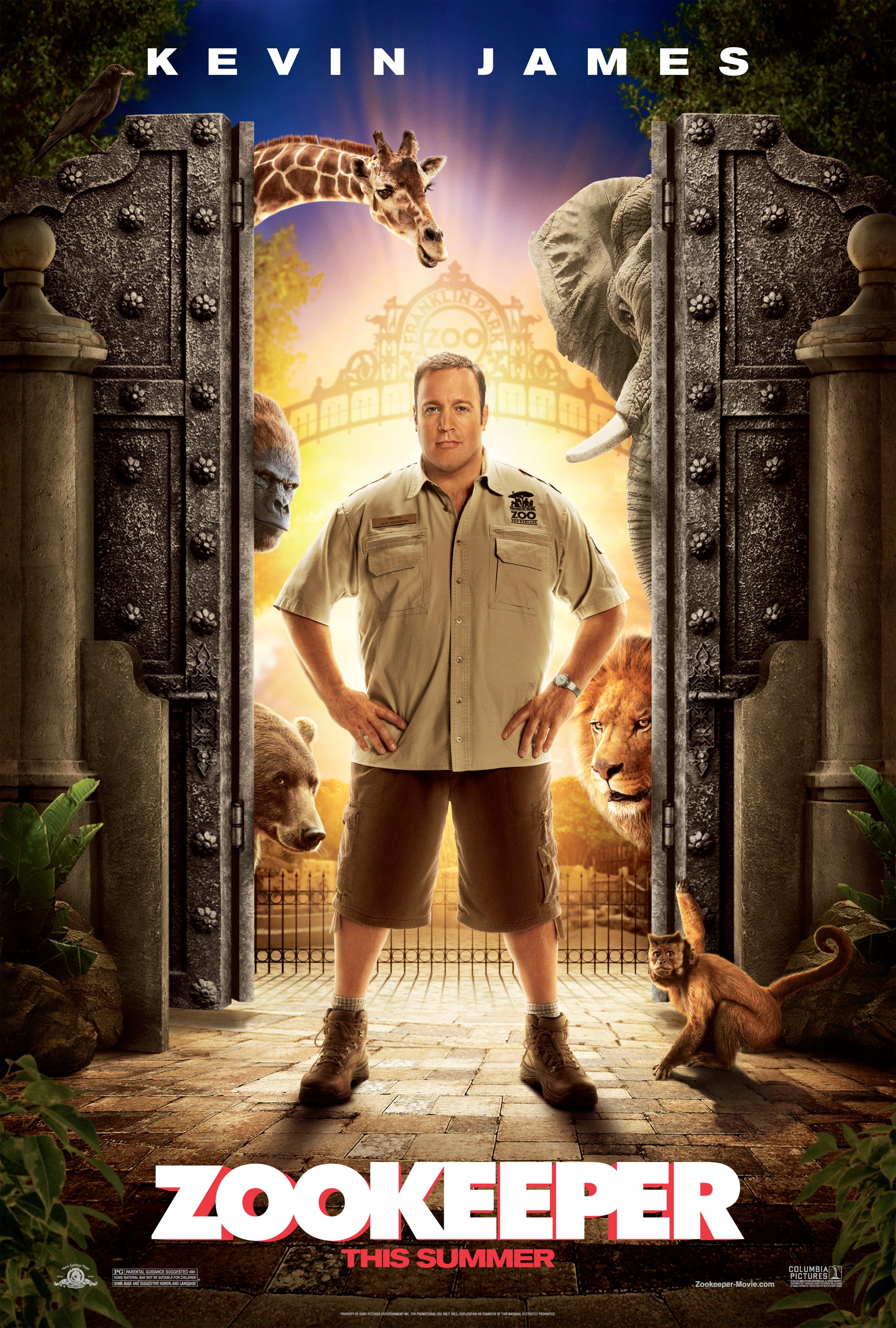Hey there, animal lovers! If you're reading this, chances are you've wondered about the magic that happens behind the scenes at your favorite zoo. Ever thought about who actually takes care of those majestic animals? Well, let me introduce you to the unsung heroes of the animal kingdom: the zookeepers. Today, we're diving deep into the world of cast from zookeeper—those amazing individuals who dedicate their lives to making sure animals are happy, healthy, and thriving. So grab your coffee (or tea), and let's get started!
You might think being a zookeeper is just about feeding animals and cleaning up after them, but there's so much more to it. These folks are like animal whisperers, scientists, and educators all rolled into one. They’re not just caretakers; they’re advocates for wildlife conservation and ambassadors for the species they work with. If you’ve ever dreamed of working with animals or just want to know what it takes to be part of the zookeeper cast, you're in for a treat. Stick around because we're about to spill all the tea!
So, buckle up! This isn’t just a story about zookeepers—it’s a story about passion, dedication, and the incredible bond between humans and animals. Let's uncover the secrets of the cast from zookeeper and why their work matters so much in today’s world. Ready? Let's dive in!
- Is Philippine Leroybeaulieu The Philippine Actress Married Find Out Here
- Anna Malygons Leaked Content A Comprehensive Guide
Table of Contents
- Who Are Zookeepers?
- Daily Life of a Zookeeper
- Education and Training Requirements
- Challenges Faced by Zookeepers
- The Rewards of Being a Zookeeper
- Famous Zookeepers Around the World
- Zookeepers and Wildlife Conservation
- Technology in Modern Zookeeping
- Career Path for Aspiring Zookeepers
- The Future of Zookeeping
Who Are Zookeepers?
Alright, let's start with the basics. Zookeepers are the backbone of any zoo or wildlife sanctuary. They're the ones who ensure animals are well-fed, safe, and mentally stimulated. But here's the thing—being a zookeeper isn't just about liking animals. It's about understanding them, studying their behaviors, and creating environments where they can thrive. And guess what? Zookeepers don’t just focus on mammals. They work with birds, reptiles, fish, and even insects. Yep, you read that right—bugs!
Cast from zookeeper means more than just a job title. It's a calling. These individuals are passionate about wildlife and committed to making a difference in the lives of animals. They spend countless hours learning about animal biology, behavior, and habitat needs. And let’s not forget—they're also educators. Zookeepers often interact with the public, teaching visitors about the importance of conservation and how we can all help protect wildlife.
What Does It Take to Be a Zookeeper?
Being a zookeeper requires a unique set of skills. You need to be physically fit because the job involves a lot of lifting, walking, and standing. You also need to be mentally tough because, let's face it, working with animals can be unpredictable. But the most important trait? Patience. Animals don’t always follow the rules, and sometimes things don’t go as planned. A good zookeeper knows how to stay calm under pressure and adapt to any situation.
- Gruesome Dee Dee Blanchard Crime Scene Photos Leak Online
- The Ultimate Guide To Www5movierulzcom Kannada Movies In 2024
Daily Life of a Zookeeper
So, what does a typical day look like for a member of the cast from zookeeper? Well, it's not all sunshine and rainbows. A typical day starts early—like, really early. Zookeepers are often up before dawn to prepare food, clean enclosures, and check on the animals. After that, it's time for feeding, enrichment activities, and monitoring animal behavior. And don’t forget the paperwork! Zookeepers keep detailed records of everything from diet changes to medical treatments.
One of the coolest parts of the job? Enrichment activities. These are activities designed to stimulate animals both physically and mentally. Think puzzle feeders, toys, and even music. Zookeepers get creative with these activities to keep animals engaged and happy. It’s like being a full-time puzzle designer for animals!
Common Misconceptions About Zookeepers
There are a lot of myths about what zookeepers do. For example, some people think it's all about cuddling with cute animals. Spoiler alert: it’s not. Zookeepers rarely get to touch the animals they care for because it can be dangerous or stressful for the animals. Another misconception? That it’s an easy job. Trust me, it’s not. Zookeepers work long hours, often in extreme weather conditions, and deal with everything from poop to medical emergencies.
Education and Training Requirements
Okay, let’s talk about how to become part of the cast from zookeeper. First things first—you need to get an education. Most zookeepers have a degree in biology, animal science, or a related field. But that’s just the beginning. After graduation, aspiring zookeepers often complete internships or volunteer at zoos to gain hands-on experience. And let’s not forget the training. Zookeepers undergo rigorous training programs to learn everything from animal handling to emergency response.
But here’s the kicker—education never stops. Zookeepers are lifelong learners. They attend workshops, conferences, and seminars to stay up-to-date with the latest trends in animal care and conservation. It’s a lot of work, but for those who love animals, it’s worth it.
Key Skills for Zookeepers
Besides formal education, there are some key skills that every zookeeper needs:
- Communication skills: You’ll be working with animals, but you’ll also be interacting with colleagues and the public.
- Problem-solving skills: Animals can be unpredictable, so you need to think on your feet.
- Empathy: Understanding animal behavior is crucial for providing the best care possible.
- Physical endurance: This job requires a lot of physical activity, so being in good shape is essential.
Challenges Faced by Zookeepers
No job is without its challenges, and zookeeping is no exception. One of the biggest challenges is dealing with sick or injured animals. It’s heartbreaking when an animal you’ve cared for gets sick, and sometimes, despite your best efforts, you can’t save them. Another challenge is working in extreme weather conditions. Whether it’s freezing cold or scorching hot, zookeepers are out there, rain or shine.
And let’s not forget the financial challenges. Zoos often operate on tight budgets, which can make it difficult to provide the best care possible. Zookeepers sometimes have to get creative with resources to ensure animals are happy and healthy.
How Zookeepers Overcome Challenges
So, how do zookeepers deal with these challenges? It’s all about teamwork. Zookeepers work closely with veterinarians, nutritionists, and other animal care professionals to ensure animals receive the best care possible. They also rely on each other for support. After all, being part of the cast from zookeeper means being part of a tight-knit community of people who share the same passion for animals.
The Rewards of Being a Zookeeper
Despite the challenges, being a zookeeper is incredibly rewarding. There’s nothing quite like seeing an animal thrive under your care. Whether it’s a baby animal growing up healthy or a sick animal recovering, every success is a victory worth celebrating. And let’s not forget the joy of working with animals every day. It’s not just a job—it’s a lifestyle.
Another reward? The impact you can have on the world. Zookeepers are at the forefront of wildlife conservation efforts. They work tirelessly to protect endangered species and educate the public about the importance of conservation. It’s a job that makes a real difference in the world.
Why Do Zookeepers Love Their Jobs?
For many zookeepers, it’s all about the animals. They love the challenge of understanding complex animal behaviors and creating environments where animals can thrive. They also love the sense of purpose that comes with their work. Knowing that you’re making a difference in the lives of animals is incredibly fulfilling.
Famous Zookeepers Around the World
There are some pretty famous names in the world of zookeeping. One of the most well-known is Steve Irwin, aka the Crocodile Hunter. Steve was a passionate advocate for wildlife conservation and inspired millions of people around the world to care about animals. Another famous zookeeper is Jane Goodall, who revolutionized our understanding of chimpanzees. These individuals are just a few examples of the amazing work being done by zookeepers around the world.
Here’s a quick rundown of some famous zookeepers:
- Steve Irwin: Known for his work with crocodiles and wildlife conservation.
- Jane Goodall: Pioneered research on chimpanzees and their behavior.
- Jack Hanna: Famous for his appearances on TV shows and his work with animals.
Bio of a Zookeeper
Let’s take a closer look at one of these famous zookeepers. Here’s a quick bio of Steve Irwin:
| Name | Steve Irwin |
|---|---|
| Born | February 22, 1962 |
| Place of Birth | Epping, Victoria, Australia |
| Known For | Wildlife conservation and crocodile research |
| Legacy | Inspired millions to care about wildlife |
Zookeepers and Wildlife Conservation
One of the most important roles of zookeepers is wildlife conservation. Zoos play a vital role in protecting endangered species and educating the public about the importance of conservation. Zookeepers work closely with conservationists to develop breeding programs, habitat restoration projects, and public awareness campaigns. Their work is crucial in ensuring that future generations can enjoy the beauty of wildlife.
But here’s the thing—conservation isn’t just about animals. It’s about the environment as a whole. Zookeepers understand that everything is interconnected, and they work tirelessly to protect ecosystems and promote sustainability.
Conservation Success Stories
There are some incredible success stories in the world of conservation. One of the most notable is the recovery of the California condor. Thanks to the efforts of zookeepers and conservationists, this critically endangered species is making a comeback. Another success story is the reintroduction of the Arabian oryx into the wild. These animals were once extinct in the wild, but thanks to breeding programs at zoos, they’re now thriving in their natural habitat.
Technology in Modern Zookeeping
Technology is changing the way zookeepers do their jobs. From GPS tracking devices to drones, technology is helping zookeepers monitor animal behavior and health more effectively. For example, GPS collars can track the movements of animals in large enclosures, giving zookeepers valuable data on their behavior. Drones can be used to monitor animals in hard-to-reach areas, ensuring they’re safe and healthy.
But technology isn’t just about monitoring animals. It’s also about improving their lives. Enrichment activities can now be customized using technology, ensuring that animals receive the mental stimulation they need to thrive.
How Technology Benefits Zookeepers
Here are a few ways technology is benefiting zookeepers:
- Improved animal monitoring and health care
- Customized enrichment activities
- Enhanced visitor experiences
Career Path for Aspiring Zookeepers
So, you want to be part of the cast from zookeeper? Great choice! Here’s how you can get started:
- Get an education in biology, animal science, or a related field.
- Gain hands-on experience through internships or volunteer work.
- Complete a training program to learn the ropes of zookeeping.
- Stay up-to-date with the latest trends in animal care and conservation.
Remember, becoming a zookeeper is a journey. It takes time, dedication,
- Chris Cuomos Kids Ages And Family Details
- Lena Petrovas Net Worth Discover The Fortune Of The Renowned Actress


